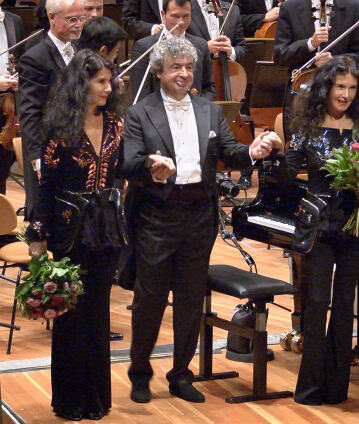Semyon Bychkov and Katia & Marielle Labèque

In this concert, conductor Semyon Bychkov and the famous piano duo Katia and Marielle Labèque make the case for a wonderful rarity: Max Bruch’s Concerto for Two Pianos which captivates with its sparkling virtuosity and a warm, orchestral sound reminiscent of Brahms. The other works of the evening were also inspired by Brahms: Antonín Dvořák’s Seventh Symphony and Detlev Glanert’s orchestral piece Weites Land.
When he was 69, Max Bruch was asked how posterity would judge the composers of his generation. Bruch’s modest and prophetic answer was: “Brahms has been dead for ten years but he is still being talked about maliciously, even among the best of music connoisseurs and critics. However, I predict that he will become more and more esteemed over time, while most of my works will gradually be forgotten. In fifty years, his splendour will shine bright as the towering composer of all time, while I will be mainly remembered only for my G minor Violin Concerto.” The unprecedented success of this work during the composer’s lifetime had long been an irritation to Bruch: “Every fortnight someone arrives and wants to play me the first concerto,” the composer once said. “Iʼve grown rude and said to them, ‘I can’t listen to this concerto any more – do you suppose I’ve only written one concerto? Just go and play the other concertos that are equally as good, if not better!’ ”
Katia and Marielle Labèque, for decades a dazzling star double-act on the international music scene, have taken the composer at his word and included Bruch’s Concerto for two pianos and orchestras in their repertoire. A pioneering act that makes a composer’s voice heard whose music was banned by the National Socialists around 85 years ago and has been marginalised in the concert hall ever since. The programme design of Semyon Bychkov, the husband of Marielle Labèque, does not intend to provide a direct comparison with the music of Johannes Brahms, who Bruch ungrudgingly admired. The fact that Bruch could nevertheless hold his own with his contemporaries who today are far more famous, becomes directly tangible in the second part of the concert with a performance of Antonín Dvořák’s Seventh Symphony, premiered in London in 1885. With this work, the Czech composer, who could claim Brahms as a supporter, wanted at the time to “move the world”.
These Berliner Philharmoniker concerts not only invite audiences to rediscover the music of Dvořák and discover a work by Bruch for the very first time, but also the sound language of composer Detlev Glanert, born in 1960. His composition Weites Land, with which Semyon Bychkov opens the programme, has a direct relationship to Brahms, as this orchestral fantasy from 2013 is based on the beginning of Brahms’s Fourth Symphony.
© 2018 Berlin Phil Media GmbH
Related interviews
Artists
Our recommendations
- Semyon Bychkov and Lisa Batiashvili perform Tchaikovsky’s Violin Concerto
- Semyon Bychkov conducts Richard Strauss’s “Alpine Symphony”
- Semyon Bychkov conducts Berio and Walton
- Bartók’s Viola Concerto with Tabea Zimmermann and Semyon Bychkov
- Semyon Bychkov conducts Mahler’s Fourth and a new work by Larcher
- Semyon Bychkov conducts Strauss and Schubert